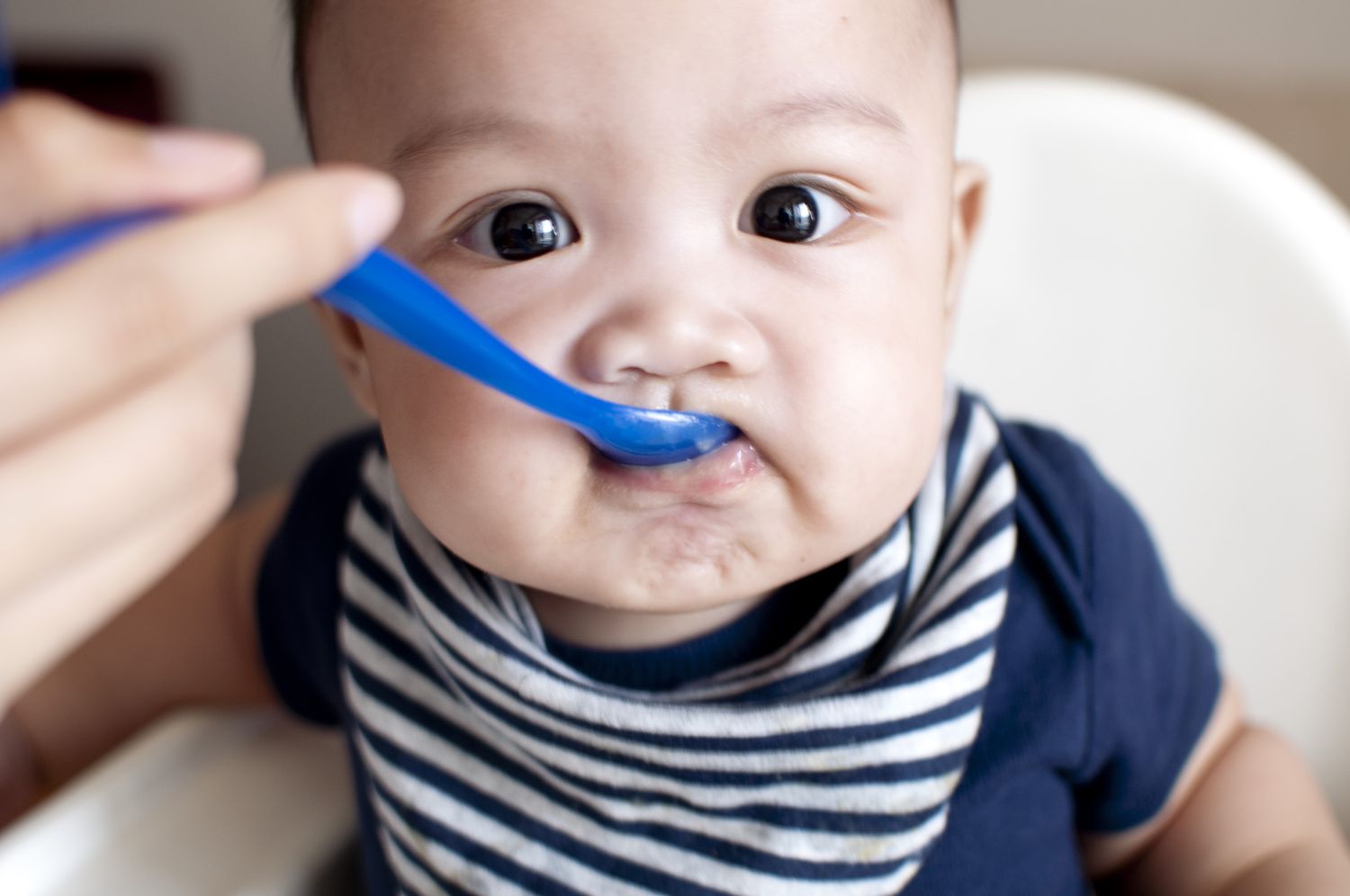Feeding baby food too early can lead to digestive problems and allergies. Early introduction of solid foods can cause diarrhea, constipation, and an increased risk of childhood obesity.
As a new parent, you’re excited to start feeding your baby solids. However, the early introduction of solid foods can cause more harm than good. Doctors recommend exclusive breastfeeding for at least the first six months of life, with the addition of solid foods at six months.
Feeding babies solid foods before their digestive system is ready can lead to gastrointestinal problems and allergies. At such an early stage, their digestive system is not prepared to handle solid food’s complex sugars and proteins. Some common side effects of feeding a baby food too early include diarrhea, constipation, and a higher risk of childhood obesity. This article will discuss the possible side effects of feeding a baby food too early and why waiting until the recommended age is essential.

Contents
The Risks Of Early Introduction To Baby Food
Detailing Baby Digestive System Development
A baby’s digestive system is quite delicate and immature at the outset. Here are the key points to keep in mind about the baby’s digestive system development:
- A baby’s digestive system can only handle breast milk or formula at birth.
- The digestive system matures gradually as the baby grows older.
- The digestive system development involves the production of enzymes that can break down food gradually.
- Certain solid foods may be hard for a baby to digest if introduced too early.
Timing For Introducing Solid Foods
Introducing solid foods to babies should be done carefully, following recommended timelines. Here are the key points to remember about the timing of introducing solid foods:
- The who recommends exclusive breastfeeding for the first six months of a baby’s life.
- After six months of age, a baby’s digestive system is better equipped to handle solid foods.
- It’s recommended to introduce solid foods one at a time, with three to five days between each new food.
- By age one, a baby should consume various foods, including fruits, vegetables, grains, and proteins.
Situations To Avoid Feeding Babies Solid Food Too Early
Feeding solid foods to a baby too early may cause various risks to their development. Here are the conditions to avoid providing solid baby food too early:
- Feeding solid foods before the baby is six months old.
- If the baby cannot sit up or hold their head up independently.
- The baby shows no interest in food or seems to be pushing it out of their mouth.
- If the baby has difficulty swallowing or suffers from choking or gagging.
Effect Of Early Feeding On Immune System Development
Feeding solid foods to a baby too early may also impact their immune system development. Here are the potential effects:
- The baby’s immune system may not be mature enough to handle solid foods, leading to allergies or intolerances.
- Delaying solid foods allows the immune system to mature, reducing the risk of allergies and intolerances.
- The baby’s gut bacteria may be affected, which plays a significant role in developing the immune system.
Understanding the risks of early introduction to baby food is crucial for every parent. Always follow the recommended timelines, avoid situations that can cause trouble to the baby’s health, and be aware of the impact that feeding solid foods too early may have on their immune system development.
Remember that your baby’s health and development are in your hands.
The 7 Harmful Side Effects Of Feeding Baby Food Too Early
Feeding a baby solid food too early can have several harmful side effects on their health and development. Here are seven potential risks:
-
Digestive issues: A baby’s digestive system is not fully developed in the early months, and introducing solid foods too soon can lead to digestive problems such as constipation, diarrhea, and upset stomach.
-
Allergies and sensitivities: Babies under six months of age have immature immune systems, making them more susceptible to food allergies and sensitivities. Early introduction of certain foods, such as nuts, eggs, and seafood, can increase the risk of allergies.
-
Choking hazards: Babies not developmentally ready for solid foods may have difficulty swallowing and may be at a higher risk of choking. Their tongue-thrust reflex, which helps protect against choking, diminishes with age.
-
Insufficient nutrition: Breast milk or formula provides all the necessary nutrients for babies in their first six months. Introducing solid foods too early can displace these nutrient-rich liquids, leading to inadequate nutrition.
-
Obesity risk: Early introduction of solid foods has been associated with an increased risk of childhood obesity. Babies who start solids too soon may consume excess calories and develop poor eating habits later in life.
-
Increased risk of chronic diseases: Studies have suggested that early introduction of certain foods, such as gluten and cow’s milk, may increase the risk of autoimmune diseases like celiac disease and type 1 diabetes in genetically predisposed individuals.
-
Disrupted feeding milestones: Introducing solid foods before a baby is developmentally ready can interfere with essential feeding milestones, such as the ability to sit up, grasp food, and self-feed. These milestones are crucial for developing fine motor skills and oral coordination.
It’s essential to follow the guidelines recommended by pediatricians and wait until your baby is around six months old before introducing solid foods. Always consult a healthcare professional for personalized advice regarding your baby’s nutrition and feeding schedule.
Frequently Asked Questions
What Are The Risks Of Giving Baby Food Too Early?
Feeding your baby solid food before six months can increase the risk of obesity, allergies, and diarrhea. The baby’s digestive system may not be mature enough to handle solid food, leading to digestive issues, bacterial infections, and choking.
How Do I Know When My Baby Is Ready For Solids?
A baby ready for solid food can hold their head up, sit up, and show an interest in food. They will also have lost the tongue-thrust reflex, which makes them push food out of their mouth with their tongue.
Additionally, they will display readiness cues, such as grabbing at food or opening their mouth when they bring a spoon near them.
What Types Of Food Should I Avoid Feeding My Baby?
Avoid feeding babies cow’s milk, honey, and foods that are choking hazards, such as popcorn and nuts. Also, avoid giving your baby foods high in salt, sugar, or saturated fat, as these can lead to health issues such as tooth decay and obesity.
Can I Feed My Baby Pureed Fruits And Vegetables?
Once your baby is ready for solid food, a pureed version of fruits and vegetables is an excellent source of essential vitamins and nutrients. However, choose simple and mild-flavored fruits and vegetables, such as sweet potatoes, carrots, pears, or applesauce, and avoid giving your baby fruit juice.
Should I Be Concerned If My Baby Shows An Aversion To Solid Foods?
It is not uncommon for a baby to get used to the texture and taste of solid food. However, if your baby shows persistent refusal or aversion to solid food, consult your pediatrician, as it may indicate an underlying issue, such as gastrointestinal disorders.
Conclusion
Feeding a baby solid foods earlier than recommended can negatively affect your baby’s health. Before introducing solid foods, waiting until your baby is six months old is best. Although some parents may feel pressured to start solids due to cultural traditions or societal pressures, this should not be at the expense of the baby’s health.
Always consult with a pediatrician before changing a baby’s diet. Signs that a baby is ready for solids include sitting upright, having reasonable head control, and showing interest in food. Giving a baby solid foods too early can increase the risk of food allergies, decreased iron absorption, and digestive problems.
By waiting until six months and consulting with a doctor, you can help ensure your baby’s health and development. Remember, safety should always come first.

I am an accomplished writer, a devoted father, and a compassionate advocate for new and experienced parents in my baby’s parenting journey. With a wealth of firsthand experience and a deep understanding of the joys and challenges of raising children, I become a trusted voice in the parenting community.


